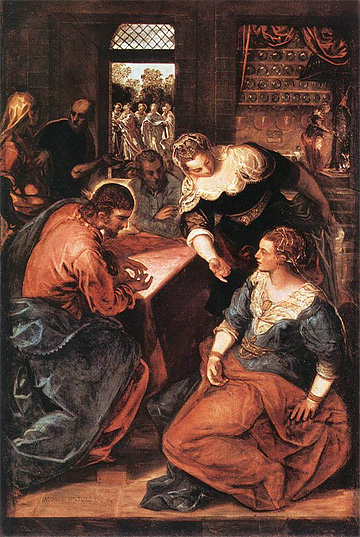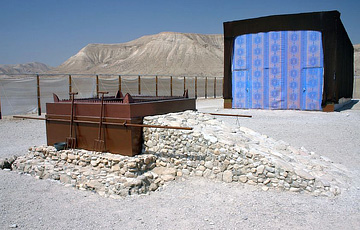In my last post I began to examine echoes of Wisdom in the ministry of Jesus. By Wisdom, I mean not the human trait of wise judgment, but the divine characteristic pictured in the Old Testament and other Jewish sources as a female consort of the Lord. When Jesus intentionally speaks in the voice of divine Wisdom, and not merely as a human sage pointing people to Wisdom, the implications are striking. Jesus, one might conclude, by talking as if he himself were God’s Wisdom, is suggesting that he himself is in some sense divine.
The earliest Christians took this ball and ran with it. In several passages of the New Testament, the biblical writers portray Jesus as God’s Wisdom come to earth (see, for example, Colossians 1:15-20; Hebrews 1:1-4). Perhaps the most obvious and significant of these texts is John 1:1-18, the prologue of John’s gospel. This passage begins:
In the beginning was the Word, and the Word was with God, and the Word was God. He was in the beginning with God. All things came into being through him, and without him not one thing came into being. What has come into being in him was life, and the life was the light of all people. The light shines in the darkness, and the darkness did not overcome it.
Now at first glance, this passage appears to associate Jesus with the Word of God, not the Wisdom of God. And it surely does make this association. In the Old Testament, God speaks creation into existence (Genesis 1). Thus one might say, as some who wrote the books of the Old Testament did, that the Word of God created the world. Take Psalm 33, for example:
For the word of the LORD is upright,
and all his work is done in faithfulness. . . .
By the word of the LORD the heavens were made,
and all their host by the breath of his mouth. (33:4,6)
Moreover, as the Old Testament records that “the word of the Lord” came to someone to reveal God’s truth, so John’s prologue recognizes Jesus the Word as the one through whom God’s ultimate revelation has come.
Without question, therefore, the Old Testament notion of the Word of God stands behind the opening verses of John’s gospel. But this isn’t the whole story, because the echoes of Wisdom in John 1:1-18 are so loud as not to be missed by anyone familiar with the Jewish Wisdom tradition. Consider Proverbs 3:19, for example: “The LORD by wisdom founded the earth; by understanding he established the heavens.” Sounds a lot like John 1:3, doesn’t it? But this is just the beginning. Consider the following parallels between the Word of God in John 1 and Wisdom in Jewish tradition:
The Word of God (John 1:1-3)
In the beginning was the Word, and the Word was with God, and the Word was God. He was in the beginning with God. All things came into being through him, and without him not one thing came into being. (vv. 1-3)
The Wisdom of God (Prov 8:22-23, 27-30)
The LORD created me at the beginning of his work, the first of his acts of long ago. Ages ago I was set up, at the first, before the beginning of the earth.
When he established the heavens, I was there, when he drew a circle on the face of the deep, when he made firm the skies above, when he established the fountains of the deep, when he assigned to the sea its limit, so that the waters might not transgress his command, when he marked out the foundations of the earth, then I was beside him, like a master worker; and I was daily his delight, rejoicing before him always.
The Word of God (John 1:3-4)
What has come into being in him was life, and the life was the light of all people.
The Wisdom of God (Prov 8:35; Wis 6:12)
For whoever finds me finds life and obtains favor from the LORD.
Wisdom is radiant and unfading, and she is easily discerned by those who love her, and is found by those who seek her.
The Word of God (John 1:11)
He came to what was his own, and his own people did not accept him (v. 11)
The Wisdom of God (Prov 1:24)
. . . I have called and you refused, have stretched out my hand and no one heeded.
The Word of God (John 1:10-12)
He was in the world, and the world came into being through him; yet the world did not know him. He came to what was his own, and his own people did not accept him. But to all who received him, who believed in his name, he gave power to become children of God.
The Wisdom of God (Wis 9:10-11)
Send her forth from the holy heavens, and from the throne of your glory send her, that she may labor at my side, and that I may learn what is pleasing to you. For she knows and understands all things, and she will guide me wisely in my actions and guard me with her glory.
The Word of God (John 1:14)
And the Word became flesh and lived among us, and we have seen his glory, the glory as of a father’s only son, full of grace and truth.
The Wisdom of God (Wis 7:25-26)
For she is a breath of the power of God, and a pure emanation of the glory of the Almighty; therefore nothing defiled gains entrance into her. For she is a reflection of eternal light, a spotless mirror of the working of God, and an image of his goodness.
There are actually many more parallels between the Word in John’s prologue and Wisdom in Jewish tradition, a couple of which I’ll examine later. But the main point is clear, I believe. John’s picture of Jesus as the Word of God has been painted with Jewish Wisdom as a model.
John’s association of Word and Wisdom, as it turns out, was also something found in older Jewish sources. Consider the following passages:
For the LORD gives wisdom; from his mouth come knowledge and understanding (Prov 2:6).
It is he who made the earth by his power, who established the world by his wisdom, and by his understanding stretched out the heavens. When he utters his voice, there is a tumult of waters in the heavens, and he makes the mist rise from the ends of the earth. (Jer 10:12-13)
“O God of my ancestors and Lord of mercy, who have made all things by your word, and by your wisdom have formed humankind . . . .” (Wis 9:1-2)
For wisdom becomes known through speech, and education through the words of the tongue (Sir 4:24).
So, following in the footsteps of the Jewish sages, John painted a picture of God’s Word/Wisdom in the prologue of his Gospel. The most shocking element of this picture, of course, is the unprecedented identification of Word/Wisdom with a man, with Jesus of Nazareth. I’ll examine this in greater detail in my next post.

